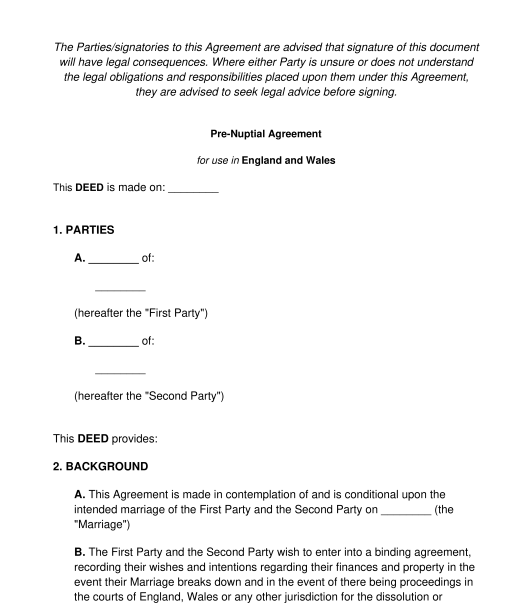 08/11/2025
08/11/2025

Answer a few questions and your document is created automatically.

Your document is ready! You will receive it in Word and PDF formats. You will be able to modify it.

 08/11/2025
08/11/2025
 Word and PDF
Word and PDF
 12 to 15 pages
12 to 15 pages



A pre-nuptial agreement is an agreement which is made between two parties before they marry or before they enter into a civil partnership. The agreement will set out how the parties would like their assets to be divided between them if they choose to divorce or dissolve their civil partnership in the future. This pre-nuptial agreement is designed for use where the parties live in England and Wales.
A pre-nuptial agreement is an agreement that is entered into in contemplation of marriage or civil partnership. This type of agreement will specify what the parties would like to happen with the division of their assets and finances in the event of a divorce or dissolution.
A cohabitation agreement will typically be used by an unmarried couple (who do not intend to marry in the future).
No. It is not mandatory to have this kind of agreement before marriage. Some couples choose to have a pre-nuptial agreement, particularly where:
The parties must disclose all information about their finances to each other before entering into a pre-nuptial agreement.
The parties to the agreement will receive independent legal and may receive accountancy advice prior to signing the agreement. This ensures that both parties understand the agreement and its consequences.
Each party should receive a copy of the proposed agreement well in advance of the intended marriage or civil partnership ceremony. The agreement should be signed no less than 21 days prior to the date of marriage or civil partnership ceremony (but no more than 1 year prior to the ceremony).
Any person who intends to enter into a legal marriage or civil partnership can enter into a pre-nuptial agreement. The legal age of marriage/civil partnership is 18.
A pre-nuptial agreement is intended to remain in place for the duration of a marriage. The agreement may then be considered as part of any divorce and finance proceedings/settlement.
The parties may wish to prepare wills to provide for the division of their assets in the case of death.
The agreement such be signed as a deed in advance of the marriage or civil partnership ceremony (a minimum of 21 days in advance of the ceremony, but no more than 1 year in advance of the ceremony). Each party should then retain a signed copy for future reference.
Each party will provide information to the other about their assets and financial circumstances prior to the signing of the agreement. That disclosure will then be exhibited in the schedules to the agreement. An example of the format of disclosure can be found in the Form E which is used in family proceedings.
Yes. The agreement should be signed by each party together with any legal advisors, and each party should be provided with a signed copy. The signatures of each party must be witnessed as the agreement will be executed as a deed.
A witness should
The agreement will not be reviewed by a lawyer to ensure that the legal content applies to the personal situation of the parties. In order to review the particulars of any final agreement, it will be necessary to instruct a lawyer. For assistance finalising, reviewing and executing a deed, advice should be sought from a lawyer who is regulated by an approved regulator in the legal services sector. It is possible to search for a lawyer using the Law Society – find a solicitor webpage.
In order to receive independent legal advice, it is necessary to instruct a solicitor. The solicitor will advise of their fees in advance.
For assistance finalising, reviewing and executing a deed, advice should be sought from a lawyer who is regulated by an approved regulator in the legal services sector. It is possible to search for a lawyer using the Law Society – find a solicitor webpage.
Pre-nuptial agreements are not strictly binding in England and Wales. However, it is possible that the agreement can be considered in any future dispute during financial proceedings should the parties divorce or dissolve their civil partnership. A pre-nuptial agreement should be considered by the Court unless there are circumstances to show it would be unfair to do so.
A Court is more likely to consider a pre-nuptial agreement where:
Yes, a pre-nuptial agreement should be reviewed and amended at appropriate intervals. It is common to do this after the birth of a child, or where there is a significant change in circumstances. The agreement will provide provisions for the agreement to be reviewed and amended, as appropriate.
A pre-nuptial agreement should:
The following legal provisions are relevant to pre-nuptial agreements:
You fill out a form. The document is created before your eyes as you respond to the questions.
At the end, you receive it in Word and PDF formats. You can modify it and reuse it.
Guides to help you
Pre-nuptial Agreement - Sample, template - Word and PDF
Country: United Kingdom